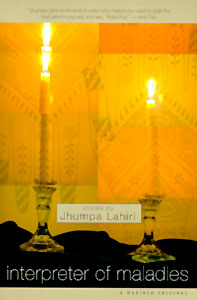`Interpreter of Maladies` is collection of nine markable stories. The title story of the book is the story of a tourist guide who at his free time works with a doctor to earn some more. At that place he worked as the interpreter. There he translates the Gujarati spoken by some of his patients. Thus the name Interpreter of Maladies clearly describes the name in a perfect way.
 Jhumpa Lahiri was born in the year of 1967 in London, England. She is a graduate from Barnard College, where she received a B.A. in English literature. She did her post-graduation from the Boston University, where she received an M.A. in English, M.A. in Creative Writing and M.A. in Comparative Studies in Literature and the Arts, and a Ph.D. in Renaissance Studies. She has taught creative writing at Boston University and the Rhode Island School of Design. Her debut collection, Interpreter of Maladies, won the 2000 Pulitzer Prize in fiction category. It was translated into twenty-nine languages and became a bestseller both in the United States and abroad. In addition to the Pulitzer, it has also received the PEN or Hemingway Award, the New Yorker Debut of the Year award, an American Academy of Arts and Letters Addison Metcalf Award, and a nomination for the Los Angeles Times Book Prize. Lahiri was awarded a Guggenheim Fellowship in 2002. The Namesake is Jhumpa Lahiri`s first novel. She lives in New York with her husband and son. She is a prolific writer with an excellent writing skill.
Jhumpa Lahiri was born in the year of 1967 in London, England. She is a graduate from Barnard College, where she received a B.A. in English literature. She did her post-graduation from the Boston University, where she received an M.A. in English, M.A. in Creative Writing and M.A. in Comparative Studies in Literature and the Arts, and a Ph.D. in Renaissance Studies. She has taught creative writing at Boston University and the Rhode Island School of Design. Her debut collection, Interpreter of Maladies, won the 2000 Pulitzer Prize in fiction category. It was translated into twenty-nine languages and became a bestseller both in the United States and abroad. In addition to the Pulitzer, it has also received the PEN or Hemingway Award, the New Yorker Debut of the Year award, an American Academy of Arts and Letters Addison Metcalf Award, and a nomination for the Los Angeles Times Book Prize. Lahiri was awarded a Guggenheim Fellowship in 2002. The Namesake is Jhumpa Lahiri`s first novel. She lives in New York with her husband and son. She is a prolific writer with an excellent writing skill.
Synopsis:
Interpreter of Maladies by Jhumpa Lahiri is a multi-layered story about a second-generation Indian-American couple. In the story they come to India to visit different places along with their three children and hire a tour-guide to see the famous Sun Temple at Konarak. Their guide, Mr. Kapasi becomes curious about the couple who look Indian, yet dress like American tourists and speak with an American accent that he had heard many times on American TV shows. The author illustrates the work of Mr. Kapasi elaborately as he works as a tour guide only on weekends, and has another job during the weekdays as an interpreter in a doctor`s office. There he translates the Gujarati spoken by some of his patients. Mina Das, the wife proclaims his job as an interpreter of maladies as `romantic.` Energized by this comment Mr. Kapasi, whose own marriage is wavering, looks at her closely and begins to fantasize a romantic relationship with her. The whole story is told from Kapasi`s point of view. The couple invite him to be included in the photographs they take; Mina asks him for his address so they can send him copies from America. Again this comment enhances his fantasy. During their journey to different places mina confesses different facts of her life to Kapasi as her second child is fathered by her husband`s Punjabi Indian friend. "The Third and Final Continent" is another one from this collection, which is a first-person story of an Indian immigrant who looks back at his first few weeks in America, thirty years ago. As a whole all the nine of the stories are a showcase of elegant craft.
During their journey to different places mina confesses different facts of her life to Kapasi as her second child is fathered by her husband`s Punjabi Indian friend. "The Third and Final Continent" is another one from this collection, which is a first-person story of an Indian immigrant who looks back at his first few weeks in America, thirty years ago. As a whole all the nine of the stories are a showcase of elegant craft.
`Interpreter of Maladies` is a marvelous collection of stories by Jhumpa Lahiri, which is published by Mariner Books.
`Interpreter of Maladies` can be considered as Jhumpa Lahiri`s one of the best creations. She set the background in India but always concentrates on the emotions and feelings of human beings. She never put extra importance on `Indian ness` if not necessary. The simple and detailed style of storytelling of the author simply mesmerized the readers and their lies the success behind all the awards and popularity as well.



















